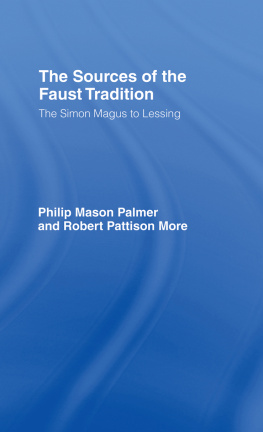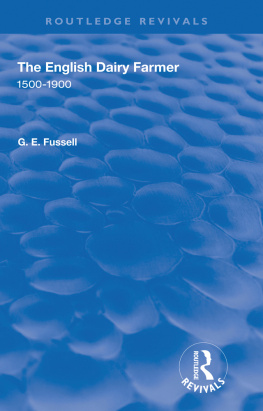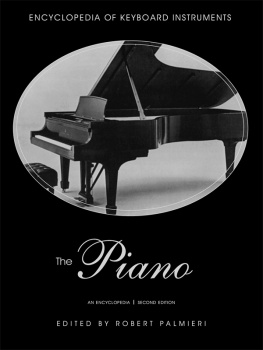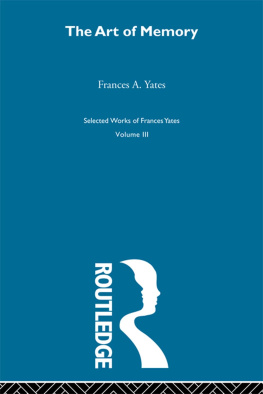Robert P. More - Sources of the Faust Tradition. The Simon Magus to Lessing
Here you can read online Robert P. More - Sources of the Faust Tradition. The Simon Magus to Lessing full text of the book (entire story) in english for free. Download pdf and epub, get meaning, cover and reviews about this ebook. year: 1966, publisher: Routledge, genre: Science. Description of the work, (preface) as well as reviews are available. Best literature library LitArk.com created for fans of good reading and offers a wide selection of genres:
Romance novel
Science fiction
Adventure
Detective
Science
History
Home and family
Prose
Art
Politics
Computer
Non-fiction
Religion
Business
Children
Humor
Choose a favorite category and find really read worthwhile books. Enjoy immersion in the world of imagination, feel the emotions of the characters or learn something new for yourself, make an fascinating discovery.
- Book:Sources of the Faust Tradition. The Simon Magus to Lessing
- Author:
- Publisher:Routledge
- Genre:
- Year:1966
- Rating:5 / 5
- Favourites:Add to favourites
- Your mark:
- 100
- 1
- 2
- 3
- 4
- 5
Sources of the Faust Tradition. The Simon Magus to Lessing: summary, description and annotation
We offer to read an annotation, description, summary or preface (depends on what the author of the book "Sources of the Faust Tradition. The Simon Magus to Lessing" wrote himself). If you haven't found the necessary information about the book — write in the comments, we will try to find it.
Sources of the Faust Tradition. The Simon Magus to Lessing — read online for free the complete book (whole text) full work
Below is the text of the book, divided by pages. System saving the place of the last page read, allows you to conveniently read the book "Sources of the Faust Tradition. The Simon Magus to Lessing" online for free, without having to search again every time where you left off. Put a bookmark, and you can go to the page where you finished reading at any time.
Font size:
Interval:
Bookmark:

THE SOURCES OF THE FAUST TRADITION
FROM SIMON MAGUS TO LESSING
THE SOURCES OF THE FAUST TRADITION
FROM SIMON MAGUS TO LESSING
BY
PHILIP MASON PALMER
and
ROBERT PATTISON MORE

First published 1936
by Frank Cass
Published 2013 by Routledge
2 Park Square, Milton Park, Abingdon, Oxon OX14 4RN
711 Third Avenue, New York, NY, 10017, USA
Routledge is an imprint of the Taylor & Francis Group, an informa business
Copyright 1936 by Oxford University Press, New York, Inc.
LIBRARY OF CONGRESS CATALOG CARD NUMBER: 66-19729
ISBN 13: 978-0-714-62075-6 (hbk)
PREFACE
IN an experience of many years in conducting a course in Goethes Faust, trying to present to students of varied types and training the background out of which the drama grew, the compilers of this text have constantly felt the need of a collection of source material which would make that background more real and consequently more interesting.
Whether a student is studying the background of Goethes Faust, or any other subject, it is desirable, both from the point of view of holding his interest and of developing his power of judgment, that he get as much direct contact as possible with the original materials that make up his field of study. But the original materials that are implied in a study of the growth and development of the Faust legend are widely scattered and for the undergraduate often difficult, if not impossible, of access. Furthermore, knowing, as he frequently does, little Latin and less Greek, it is very questionable whether he can use them if he is able to find them.
The authors have endeavored to bring together in usable form the materials in question. The content and form of the collection have been in part determined by its primary purpose of serving as an aid to students receiving their first serious introduction to Goethes masterpiece and in part by the trend of Faust research. It is intended to be used as a supplement to the usual scholarly edition in the students hands.
The authors are deeply grateful to the many who have been helpful with friendly hints and counsel. They wish to acknowledge especially the assistance of Professors Charles J. Goodwin and Adolph F. Pauli in checking the translations of the Cyprianus and Theophilus selections respectively; the courtesy of the Committee on Rotographs of MSS. and Rare Printed Books of the Modern Language Association of America in supplying a photostatic copy of the British Museum text of the English Faust Book of 1592; and, finally, the kindness of Professor John A. Walz, of Harvard, who, with characteristic thoroughness and patience, looked over the manuscript and gave many welcome suggestions.
P. M. PALMER
R. P. MORE
Bethlehem, Pa.
CONTENTS
THE SOURCES OF THE FAUST TRADITION
FROM SIMON MAGUS TO LESSING
INTRODUCTION
INTRODUCTION
THE Faust tradition, which finds in Goethes drama its loftiest and perhaps its final expression, owes its widespread interest to the fact that it became the vehicle of certain fundamental religious and philosophical problems which have ever fascinated and tormented mankind: the relationship between man and the powers of good and evil; mans revolt against human limitations; the thirst for knowledge beyond mere information; the puzzling disparity between the sublimity and the misery of human life. These problems are by no means the exclusive property of the Faust legend for they form, individually or collectively, the background of much of the worlds greatest literature. It was the good fortune of the Faust tradition that in its evolution it combined these elements in a peculiarly happy way and that it attracted and inspired the genius of one of the worlds greatest poets.
The history of the tradition in folklore and literature parallels that of many another epic theme. Its origin is obscure; the development irregular and spasmodic, sometimes halting for long periods and then again, as in Goethes day, proceeding with seven league boots. Generation after generation works at the old story, widening its scope, reforming, reinterpreting until the master-hand gives it its present form.
The beginnings of the legend so far as it concerns the notorious German magician, Doctor Faust, do not antedate the Protestant Reformation. It is in the reaction of the followers of Martin Luther to the unrestrained enthusiasm of the German Humanists, to the Humanists attitude towards educational, religious and philosophical questions that the beginnings must be sought. This reaction was natural enough in the intellectual dislocation taking place in the Germany of 1500.
Throughout the fifteenth century forces had been at work which, with much else, tended to uproot, or at least reorient many of the intellectual sign-posts of the Middle Ages. There was the break with traditional ways of thinking; the renewed interest in secular learning; the establishment of the northern universities; the rise of individualism; a general widening of the horizon. But the older Church and the new Protestant group both viewed this development with consternation and something resembling fear. However, it is from the Lutheran circle that the protest arose against inordinate ambition and ungodly speculation,a protest which found its most popular expression in the old Faust books. That the archconjuror and blowhard Faust should have been selected as the awful example of the results of an attempt to transcend human limitations is perhaps mere chance.
The growth of the legend is an interesting chapter in the history of myth development. For the Faust of the sixteenth century was merely the lodestone about which gathered in time a mass of superstition which in turn is the deposit of centuries. Many of the stories told about Faust are found in the accounts of earlier magicians. Part of the material, like the compact with the devil, is common property of the Christian Church. Other elements can be traced back to Hebrew and Persian sources antedating Christianity.
On the whole, the progress of the legend in folktale, letter, ballad, novel, and play from the earliest Faust book down to Goethe is reasonably clear. Some links in the chain are missing, it is true, as, for example, the text of the old stage play. But even in this case, it is possible, on the basis of the puppet plays and theater programs extant, to piece together the probable action.
On the other hand, the development of the magic elements in the legend, and of the compact with the devil, or perhaps better, the connection, if any, of these elements with earlier legends about magicians, is by no means as clear. Numerous predecessors of the sixteenth century magician were credited with magic powers, among them Solomon, Simon Magus, Virgil, Cyprian, Merlin, Roger Bacon, Robert the Devil, Zyto, various popes, and many lesser lights. Superstition explained the magic powers, which these individuals were reputed to possess, by a compact with Satan or some other evil spirit. The compact takes actual form in the legend of Theophilus and the legend of Proterius. The origins of both the conception of magic and of the compact are dimmed by time and lost in the mazes of occultism and demonology. How much of all this is directly connected with the Faust tradition is a moot question. None of the problems of larger import which distinguish the later forms of the tradition, with the possible exception of the relationship of man to good and evil, are to be found in the so-called predecessors. However, the influence of blood pact and magic art is unmistakable, indirect perhaps but none the less potent. Medieval Europe delighted in tales of magicians and legends of saints who had made compacts with Satan. Witness the large number of tales which contain these motifs and the popularity of such collections as the
Next pageFont size:
Interval:
Bookmark:
Similar books «Sources of the Faust Tradition. The Simon Magus to Lessing»
Look at similar books to Sources of the Faust Tradition. The Simon Magus to Lessing. We have selected literature similar in name and meaning in the hope of providing readers with more options to find new, interesting, not yet read works.
Discussion, reviews of the book Sources of the Faust Tradition. The Simon Magus to Lessing and just readers' own opinions. Leave your comments, write what you think about the work, its meaning or the main characters. Specify what exactly you liked and what you didn't like, and why you think so.






